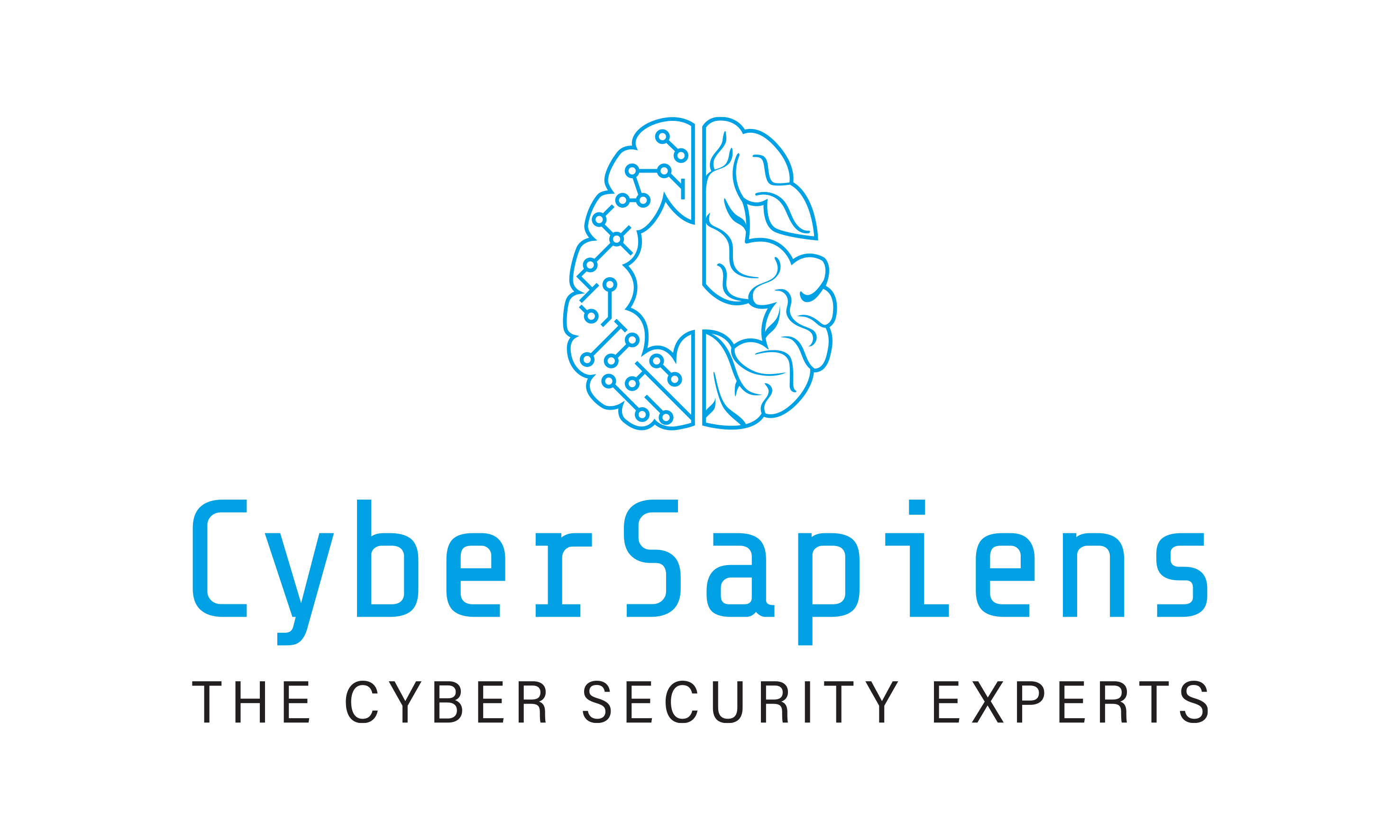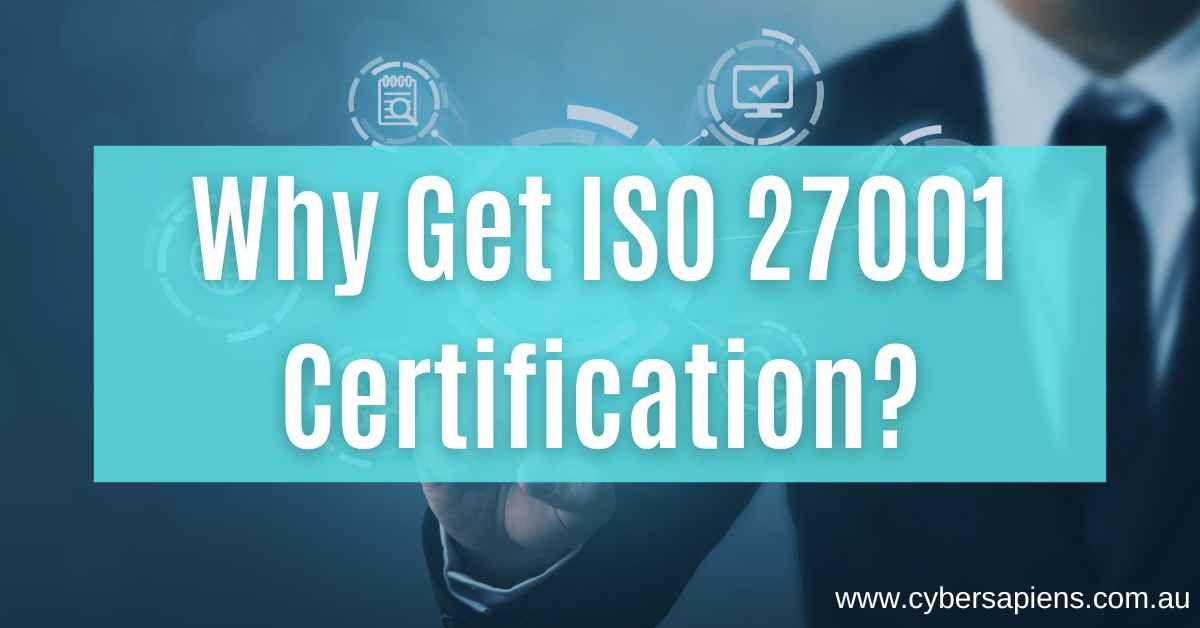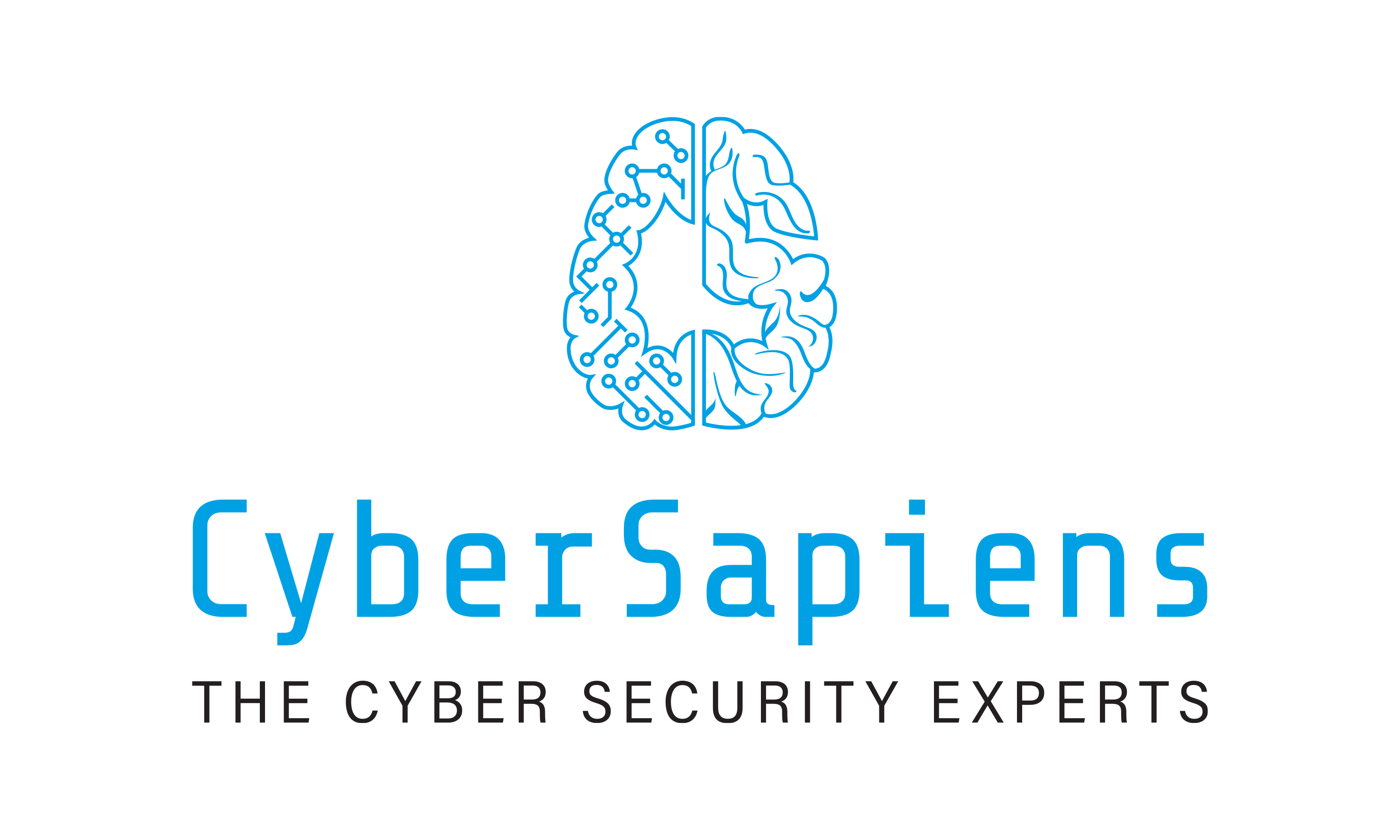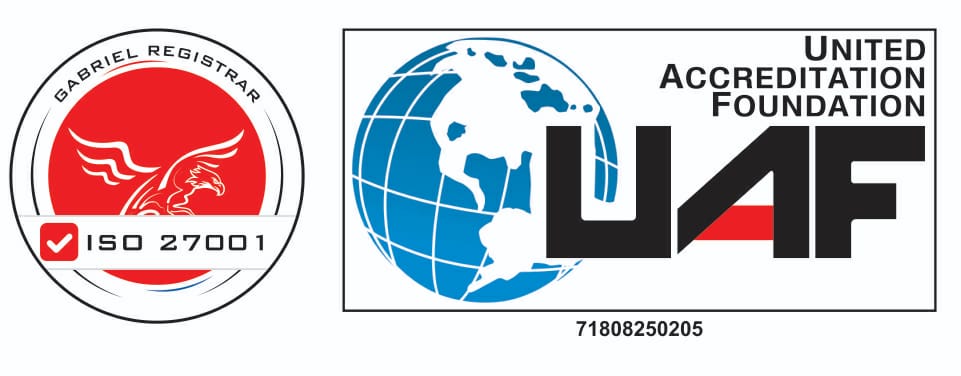Wondering why your business needs ISO 27001 Certification? In today’s digital age, information security has become a top priority for organizations across all industries.
With increasing cyber threats, companies must proactively protect their sensitive data and ensure their information assets’ confidentiality, integrity, and availability.
ISO 27001 is an internationally recognized standard that provides a framework for implementing an information security management system (ISMS) and managing risks to information security.
Organizations that obtain ISO 27001 certification demonstrate their commitment to information security and gain a competitive advantage by assuring customers, partners, and stakeholders that their information assets are protected.
This article will explore the benefits of obtaining ISO 27001 certification and why organizations of all sizes must consider implementing an ISMS based on this standard.
Table of Contents
What is ISO 27001 Certification?
ISO 27001 certification is a globally recognized standard that provides a framework for implementing an information security management system (ISMS) and managing risks to information security.
The standard outlines a systematic approach to managing sensitive information and covers various aspects of information security, including risk management, asset management, access control, and business continuity planning.
To obtain ISO 27001 certification, an organization must first develop an ISMS based on the standard’s requirements and implement it effectively across all relevant functions and levels of the organization.
The certification process involves an external audit by an accredited certification body, which assesses the organization’s ISMS against the standard’s requirements.
Once the audit is successful, the organization is issued an ISO 27001 certificate, valid for three years, subject to annual surveillance audits.
ISO 27001 certification demonstrates an organization’s commitment to information security, helps build stakeholder trust, and provides a competitive advantage by assuring customers and partners that their information assets are protected.
What are the Benefits of ISO 27001 Certification for Your Business?
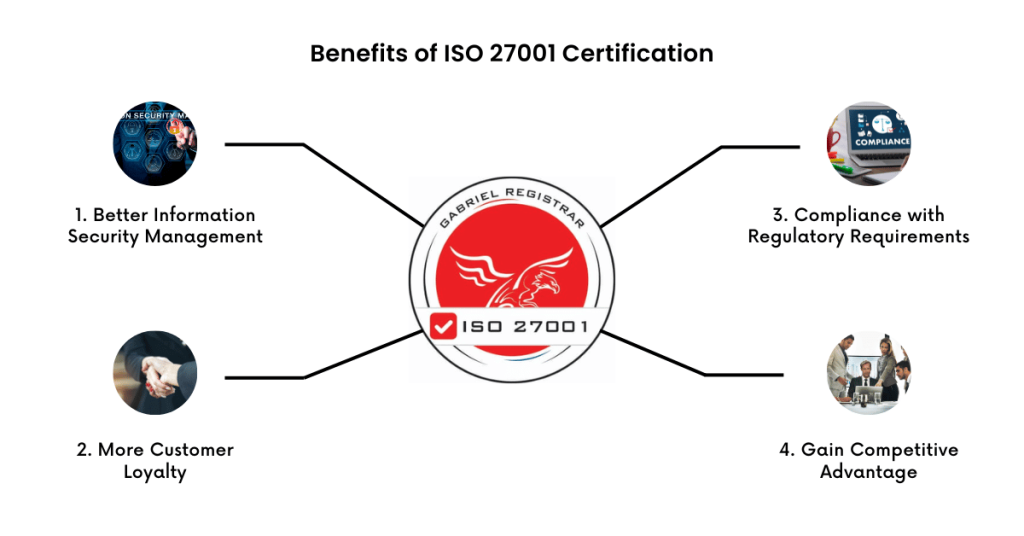
Obtaining the certification can benefit businesses of all sizes and industries. The certification indicates that the organization has implemented an effective information security management system (ISMS) and is committed to protecting its information assets.
Here are some of the key benefits of ISO 27001 certification for your business:
1. Better Information Security Management
ISO 27001 certification provides a systematic approach to managing information security risks.
It ensures that businesses have implemented the necessary controls to protect their sensitive data against various threats, including cyber attacks, data breaches, and other security incidents.
By implementing an ISMS based on ISO 27001, businesses can identify potential risks, prioritize them, and take appropriate actions to mitigate them.
2. More Customer Loyalty
ISO 27001 certification can help businesses build trust with their customers, partners, and other stakeholders. Customers are becoming more aware of the risks associated with data breaches and cyber-attacks.
They are more likely to do business with companies committed to information security.
ISO 27001 certification assures customers that their sensitive data is protected, increasing their loyalty and trust.
3. Compliance with Regulatory Requirements
The certification can help businesses comply with legal and regulatory requirements related to information security.
Many industries, such as healthcare and financial services, have specific regulations and standards that businesses must follow to protect sensitive data.
ISO 27001 certification can help businesses meet these requirements and avoid fines, legal liabilities, and reputational damage.
4. Gain Competitive Advantage
The certification can provide a competitive advantage to businesses. It demonstrates to potential customers and partners that the organization takes information security seriously.
Furthermore, initiatives were taken to implement measures to protect sensitive data. Moreover, this assures increased business opportunities and revenue.
Why Does ISO 27001 Certification Matter in Today’s Digital Age?
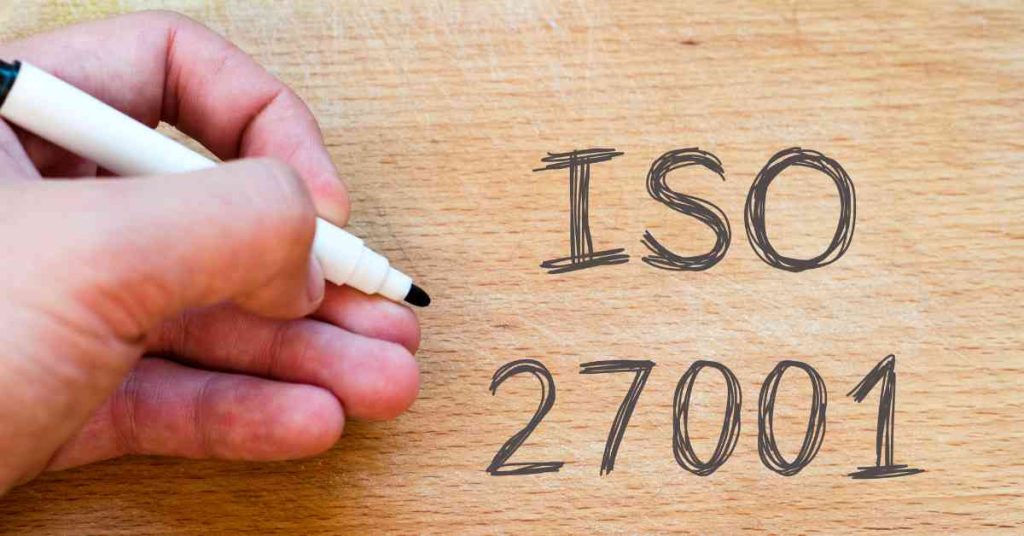
ISO certification is revolutionizing the digital age by providing a standardized approach to managing information security risks and protecting sensitive data against various threats.
The certification is increasingly becoming a requirement for businesses that operate in the digital space, such as e-commerce companies, financial institutions, and healthcare providers.
Here are some reasons how ISO 27001 certification is revolutionizing the digital age:
1. Providing a Comprehensive Framework
ISO 27001 provides a comprehensive framework for managing information security risks and protecting sensitive data.
The standard covers all aspects of information security, from risk assessment and management to incident response and business continuity.
By implementing an ISMS based on this standard, businesses can ensure that they have a systematic approach to managing information security risks.
2. Building Trust with Customers
These days, customers are becoming more conscious about the security of their personal information.
Having an ISO 27001 Certificate can help businesses build trust with their customers by demonstrating that they have implemented measures to protect sensitive data.
This can lead to increased customer loyalty and repeat business.
3. Improving Compliance with Data Protection Regulations
Data protection regulations, such as the GDPR and CCPA, require businesses to implement appropriate measures to protect sensitive data.
ISO 27001 compliance can help businesses comply with these regulations and avoid fines, legal liabilities, and reputational damage.
4. Enabling Global Business Operations
It is recognized globally, which means that businesses that obtain the certification can operate in multiple countries without having to comply with different data protection regulations.
This can save businesses time and resources while protecting sensitive data in all the countries they operate.
We Can Help You Become an ISO 27001 Certified Organisation!
How Can Information Security Certification Boost Your Business’s Security?

The ISO 27001 certification can boost your business’s security by providing a comprehensive framework for managing information security risks and protecting sensitive data against a wide range of threats.
Check out how ISO 27001 certification can help boost your business’s security:
1. Risk Assessment and Management
ISO 27001 requires businesses to conduct a thorough risk assessment and management process.
This involves identifying potential threats, assessing the likelihood and impact of those threats, and implementing appropriate controls to mitigate the risks.
By conducting a risk assessment and management process, businesses can ensure that they have a clear understanding of the threats they face and are taking appropriate measures to protect sensitive data.
2. Information Security Policies and Procedures
ISO 27001 requires businesses to develop and implement information security policies and procedures.
These policies and procedures cover all aspects of information security, from access control and encryption to incident response and business continuity.
By implementing these policies and procedures, businesses can ensure that they have a systematic approach to managing information security risks.
3. Employee Awareness and Training
ISO 27001 requires businesses to provide awareness and training to employees on information security policies and procedures.
By providing regular training, businesses can ensure that employees know the risks associated with information security and take appropriate measures to protect sensitive data.
4. On-Going Improvement and Support
ISO 27001 requirements include businesses continuously monitoring and improving their information security management system.
This involves regular audits and reviews to ensure the ISMS is effective and efficient.
By continuously improving the ISMS, businesses can stay ahead of the latest threats and take appropriate measures to protect sensitive data.
What are the Risks and Consequences of not Safeguarding Sensitive Data?
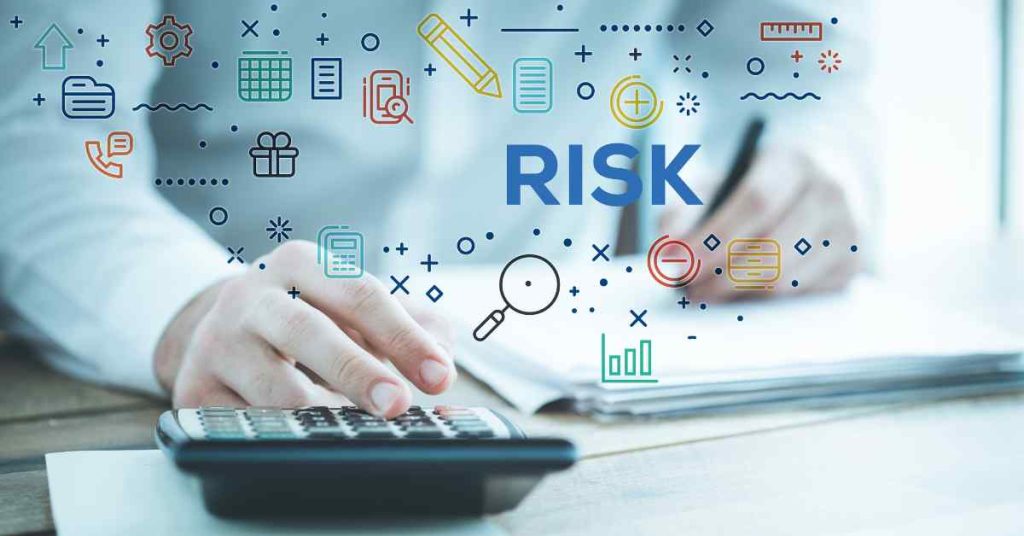
The risks and consequences of not protecting sensitive data can be significant for businesses and individuals. That is why ISO 27001 audit is highly necessary.
Furthermore, take a look at some of the most common risks and consequences:
1. Risk of Data Breaches
One of the most significant risks of not protecting sensitive data is the potential for data breaches.
Without data protection certification, cybercriminals can gain unauthorized access to sensitive information, such as personal and financial data, and use it for malicious purposes.
2. Experience Financial Losses
Data breaches and other security incidents can result in significant financial losses for businesses.
These include legal fees, fines, and settlements, as well as damage to their reputation and loss of customers.
3. Legal and Regulatory Consequences
Many countries have laws and regulations that require businesses to protect sensitive data.
Failure to comply with these laws can result in legal and regulatory consequences, including fines and legal action.
4. Posing Damage to Reputation
A data breach or other security incident can damage a business’s reputation, making it difficult to retain and attract new customers.
This can have long-lasting effects on a business’s financial performance and growth.
5. Loss of Trust and Credibility
When sensitive data is compromised, trust between the business and its customers or partners can be lost.
This loss of trust can be difficult to regain and can significantly impact a business’s relationships with its stakeholders.
What are the Necessary Steps Before ISO 27001 Certification?
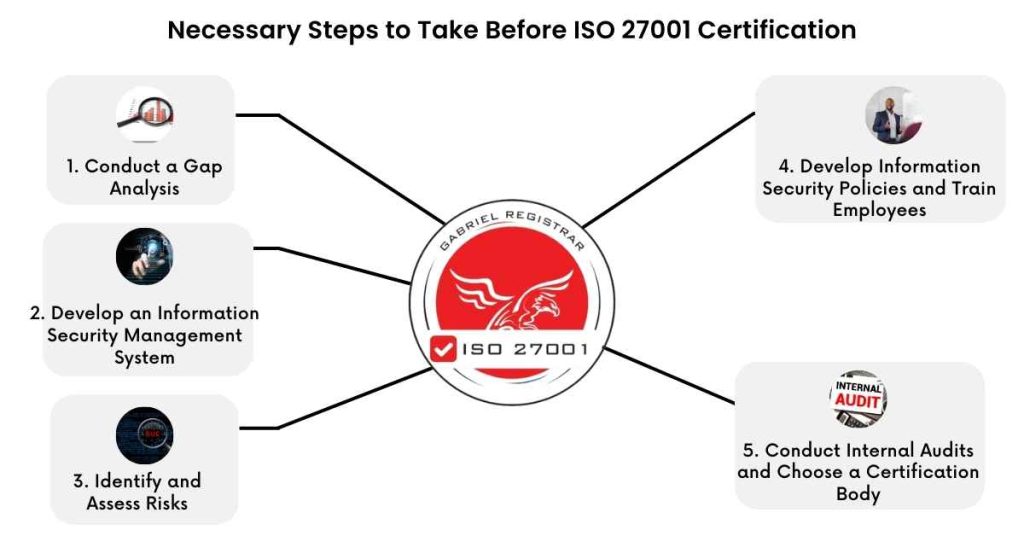
Before a business can achieve ISO 27001 certification, several necessary steps must be taken. Here are some of the most important ones:
1. Conduct a Gap Analysis
A gap analysis assesses the current state of a business’s information security controls compared to the requirements of IT security certification.
This analysis helps identify any gaps or areas that need improvement before certification can be achieved.
2. Develop an Information Security Management System
An ISMS is a systematic approach to managing sensitive company information to remain secure.
The ISMS is a set of policies, procedures, and controls that are put in place to manage information security risks.
3. Identify and Assess Risks
Businesses must identify and assess risks to the security of their information, including the likelihood and potential impact of security incidents.
This involves a risk assessment process to determine which risks are most critical and what actions should be taken to mitigate them.
4. Develop Information Security Policies and Train Employees
Policies and procedures should cover all aspects of information security, including access controls, incident management, and data backup and recovery.
All employees should be trained on information security policies and procedures, including their responsibilities for protecting sensitive information.
5. Conduct Internal Audits and Choose a Certification Body
Internal audits should be conducted regularly to ensure the ISMS works effectively and identify improvement areas.
Once all necessary steps have been taken, the business can choose a certification body to conduct an audit and certify that the business’s ISMS complies with the requirements of ISO 27001.
Conclusion: Why Get ISO 27001 Certification?
In conclusion, ISO 27001 certification is an important step businesses can take to ensure that their information security management systems are effective and compliant with internationally recognized standards.
Achieving this certification can help businesses to mitigate risks related to data breaches, financial losses, legal and regulatory consequences, damage to reputation, and loss of trust.
It can also improve a business’s security posture and enhance its ability to protect sensitive data, thereby increasing customer confidence and trust.
By following the necessary steps, businesses can achieve this certification and reap the benefits of improved information security management.
FAQs : Why Get ISO 27001 Certification?
What is ISO 27001 certification?
ISO 27001 is a globally recognized standard for information security management. It provides a framework for implementing, maintaining, and continually improving information security within an organization.
ISO 27001 certification is a formal process that verifies an organization’s compliance with the standard.
Why should I get ISO 27001 certification?
There are several benefits to getting ISO 27001 certification, including:
1. Increased credibility and trust with customers and stakeholders
2. Demonstrated commitment to information security
3. Improved risk management and reduction in security breaches
4. Improved compliance with legal and regulatory requirements
5. Increased efficiency and cost savings through standardized processes
Who can benefit from ISO 27001 certification?
Any organization that handles sensitive or confidential information, such as customer data, financial data, or intellectual property, can benefit from ISO 27001 certification. This contains organizations of all sizes and in all industries.
What is the process for obtaining ISO 27001 certification?
The process for obtaining ISO 27001 certification typically involves several steps, including:
1. Conducting a gap analysis to identify areas of non-compliance with the standard
2. Developing and implementing an information security management system (ISMS)
3. Conducting internal audits to ensure compliance with the standard
4. Hiring an external auditor to perform a certification audit
5. Addressing any non-conformities identified during the certification audit
How long does it take to get ISO 27001 certification?
The timeline for obtaining ISO 27001 certification varies depending on the size and complexity of the organization and its existing information security practices. It typically takes several months to a year or more to implement an ISMS and complete the certification process.
What are the costs associated with ISO 27001 certification?
The costs associated with ISO 27001 certification can vary depending on several factors, including the organization’s size and complexity, the certification’s scope, and the level of external support required. However, the benefits of certification often outweigh the costs in terms of improved security and credibility.
Is ISO 27001 certification mandatory?
ISO 27001 certification is not mandatory, but customers or regulatory bodies may require it in certain industries or regions. Even in cases where certification is not required, it can still provide significant benefits to organizations that handle sensitive information.
What is the difference between ISO 27001 certification and compliance?
ISO 27001 certification verifies that an organization’s information security management system complies with the standard’s requirements. Compliance refers to an organization’s adherence to legal and regulatory requirements and industry best practices.
Can ISO 27001 certification be revoked?
ISO 27001 certification can be revoked if an organization fails to maintain compliance with the standard. Organizations must undergo regular surveillance audits to maintain certification to ensure ongoing compliance.
How long is ISO 27001 certification valid?
ISO 27001 certification is valid for three years from the date of issuance. Organizations must undergo regular surveillance and recertification audits every three years to maintain certification.

